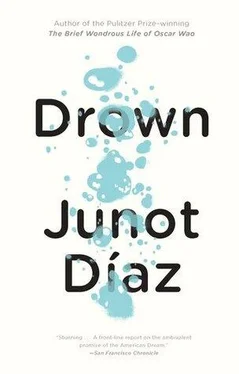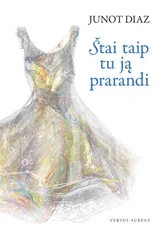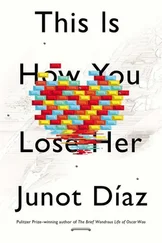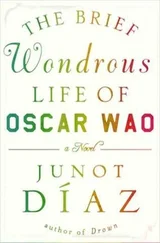Next week. I have to start on the paperwork right away.
He pinned the receipt over his bed and before he went to sleep, he checked behind it to be sure no roaches lurked. His friends were excited and the boss at the cleaning job took them out for drinks and appetizers in Harlem, where their Spanish drew more looks than their frumpy clothes. Their excitement was not his; he felt as if he’d moved too precipitously. A week later, Papi went to see the friend who had recommended el General.
I still haven’t gotten a call, he explained. The friend was scrubbing down a counter.
You will. The friend didn’t look up. A week later Papi lay in bed, drunk, alone, knowing full well that he’d been robbed.
He lost the cleaning job shortly thereafter for punching the friend off a ladder. He lost his apartment and had to move in with a familia and found another job frying wings and rice at a Chinese take-out joint. Before he left his flat, he wrote an account of what had happened to him on the pink receipt and left it on the wall as a warning to whatever fool came next to take his place. Ten cuidado, he wrote. These people are worse than sharks.
He sent no money home for close to six months. Mami’s letters would be read and folded and tucked into his well-used bags.
Papi met her on the morning before Christmas, in a laundry, while folding his pants and knotting his damp socks. She was short, had daggers of black hair pointing down in front of her ears and lent him her iron. She was originally from La Romana, but like so many Dominicans had eventually moved to the Capital.
I go back there about once a year, she told Papi. Usually around Pascua to see my parents and my sister.
I haven’t been home in a long long time. I’m still trying to get the money together.
It will happen, believe me. It took me years before I could go back my first time.
Papi found out she’d been in the States for six years, a citizen. Her English was excellent. While he packed his things in his nylon bag, he considered asking her to the party. A friend had invited him to a house in Corona, Queens, where fellow Dominicans were celebrating la Noche Buena together. He knew from a past party that up in Queens the food, dancing and single women came in heaps.
Four children were trying to pry open the plate at the top of a dryer to reach the coin mechanism underneath. My fucking quarter is stuck, a kid was shouting. In the corner, a student, still in medical greens, was trying to read a magazine and not be noticed but as soon as the kids were tired of the machine, they descended on him, pulling at his magazine and pushing their hands into his pockets. He began to shove back.
Hey, Papi said. The kids threw him the finger and ran outside. Fuck all spiks! they shrieked.
Niggers, the medical student muttered. Papi pulled the drawstring shut on his bag and decided against asking her. He knew the rule: Strange is the woman who goes strange places with a complete stranger. Instead, Papi asked her if he could practice his English on her one day. I really need to practice, he said. And I’d be willing to pay you for your time.
She laughed. Don’t be ridiculous. Stop by when you can. She wrote her number and address in crooked letters.
Papi squinted at the paper. You don’t live around here?
No but my cousin does. I can give you her number if you want.
No, this will be fine.
He had a grand time at the party and actually avoided the rum and the six-packs he liked to down. He sat with two older women and their husbands, a plate of food on his lap (potato salad, pieces of roast chicken, a stack of tostones, half an avocado and a tiny splattering of mondongo out of politeness to the woman who’d brought it) and talked about his days in Santo Domingo. It was a lucid enjoyable night that would stick out in his memory like a spike. He swaggered home around one o’clock, bearing a plastic bag loaded with food and a loaf of telera under his arm. He gave the bread to the shivering man sleeping in the hallway of his building.
When he called Nilda a few days later he found out from a young girl who spoke in politely spaced words that she was at work. Papi left his name and called back that night. Nilda answered.
Ramón, you should have called me yesterday. It was a good day to start since neither of us had work.
I wanted to let you celebrate the holiday with your family.
Family? she clucked. I only have a daughter here. What are you doing now? Maybe you want to come over.
I wouldn’t want to intrude, he said because he was a sly one, you had to admit that.
She owned the top floor of a house on a bleak quiet street in Brooklyn. The house was clean, with cheap bubbled linoleum covering the floors. Nilda’s taste struck Ramón as low-class. She threw together styles and colors the way a child might throw together paint or clay. A bright orange plaster elephant reared up from the center of a low glass table. A tapestry of a herd of mustangs hung opposite vinyl cutouts of African singers. Fake plants relaxed in each room. Her daughter Milagros was excruciatingly polite and seemed to have an endless supply of dresses more fit for quinceañeras than everyday life. She wore thick plastic glasses and sat in front of the television when Papi visited, one skinny leg crossed over the other. Nilda had a well-stocked kitchen and Papi cooked for her, his stockpile of Cantonese and Cuban recipes inexhaustible. His ropa vieja was his best dish and he was glad to see he had surprised her. I should have you in my kitchen, she said.
She liked to talk about the restaurant she owned and her last husband, who had a habit of hitting her and expecting that all his friends be fed for free. Nilda wasted hours of their study time caught between the leaves of tome-sized photo albums, showing Papi each stage of Milagros’s development as if the girl were an exotic bug. He did not mention his own familia. Two weeks into his English lessons, Papi kissed Nilda. They were sitting on the plastic-covered sofa, in the next room a game show was on the TV, and his lips were greasy from Nilda’s pollo guisado.
I think you better leave, she said.
You mean now?
Yes, now.
He drew on his windbreaker as slowly as he could, expecting her to recant. She held open the door and shut it quickly after him. He cursed her the entire train ride back into Manhattan. The next day at work, he told his co-workers that she was insane and had a snake coiled up in her heart. I should’ve known, he said bitterly. A week later he was back at her house, grating coconuts and talking in English. He tried again and again she had him leave.
Each time he kissed her she threw him out. It was a cold winter and he didn’t have much of a coat. Nobody bought coats then, Papi told me, because nobody was expecting to stay that long. So I kept going back and any chance I got I kissed her. She would tense up and tell me to leave, like I’d hit her. So I would kiss her again and she’d say, Oh, I really think you better leave now. She was a crazy lady. I kept it up and one day she kissed me back. Finally. By then I knew every maldito train in the city and I had this big wool coat and two pairs of gloves. I looked like an Eskimo. Like an American.
Within a month Papi moved out of his apartment into her house in Brooklyn. They were married in March.
Although he wore a ring, Papi didn’t act the part of the husband. He lived in Nilda’s house, shared her bed, paid no rent, ate her food, talked to Milagros when the TV was broken and set up his weight bench in the cellar. He regained his health and liked to show Nilda how his triceps and biceps could gather in prominent knots with a twist of his arm. He bought his shirts in size medium so he could fill them out.
He worked two jobs close to her house. The first soldering at a radiator shop, plugging holes mostly, the other as a cook at a Chinese restaurant. The owners of the restaurant were Chinese-Cubans; they cooked a better arroz negro than pork fried rice and loved to spend the quiet hours between lunch and dinner slapping dominos with Papi and the other help on top of huge drums of shortening. One day, while adding up his totals, Papi told these men about his familia in Santo Domingo.
Читать дальше












